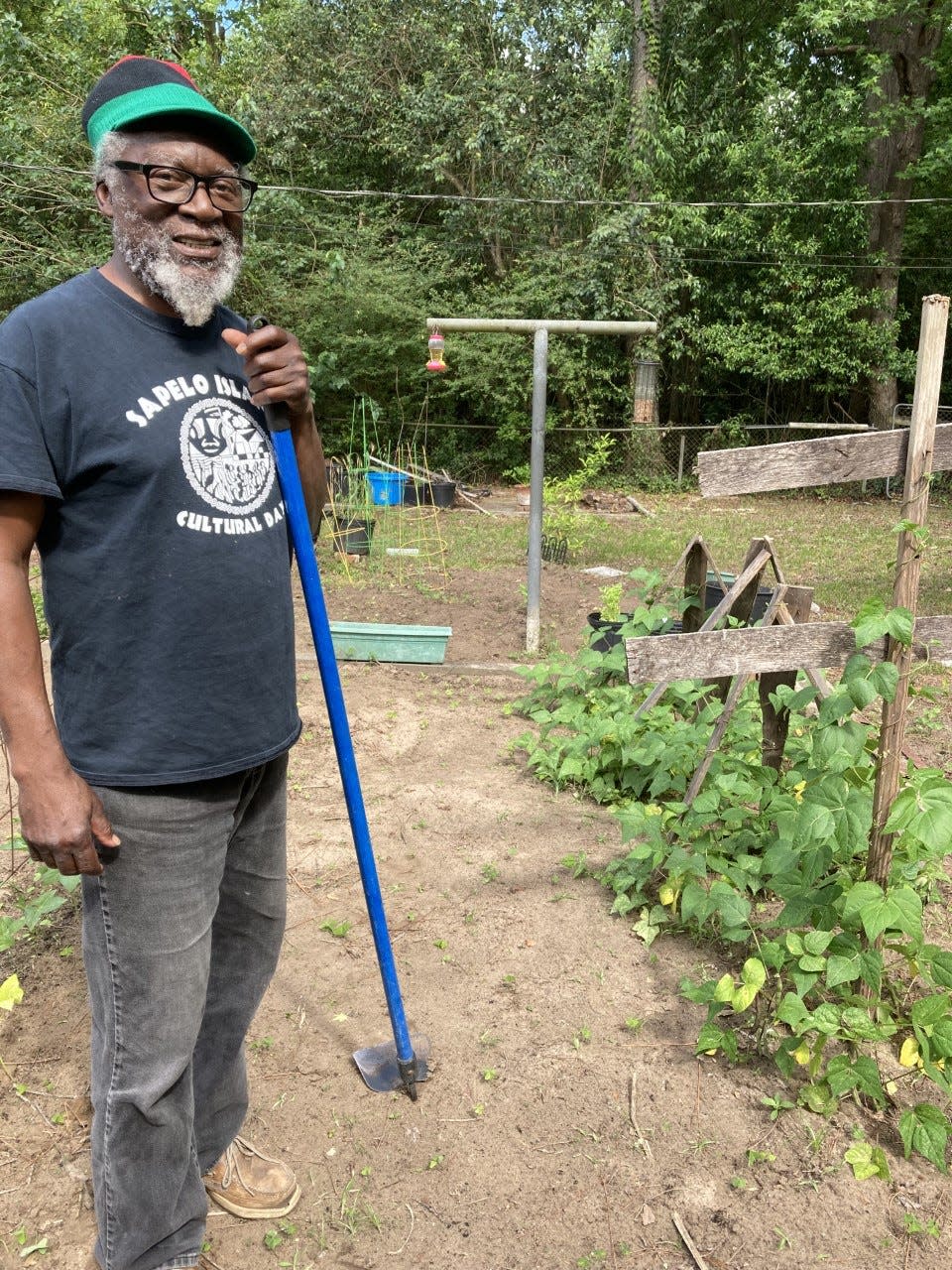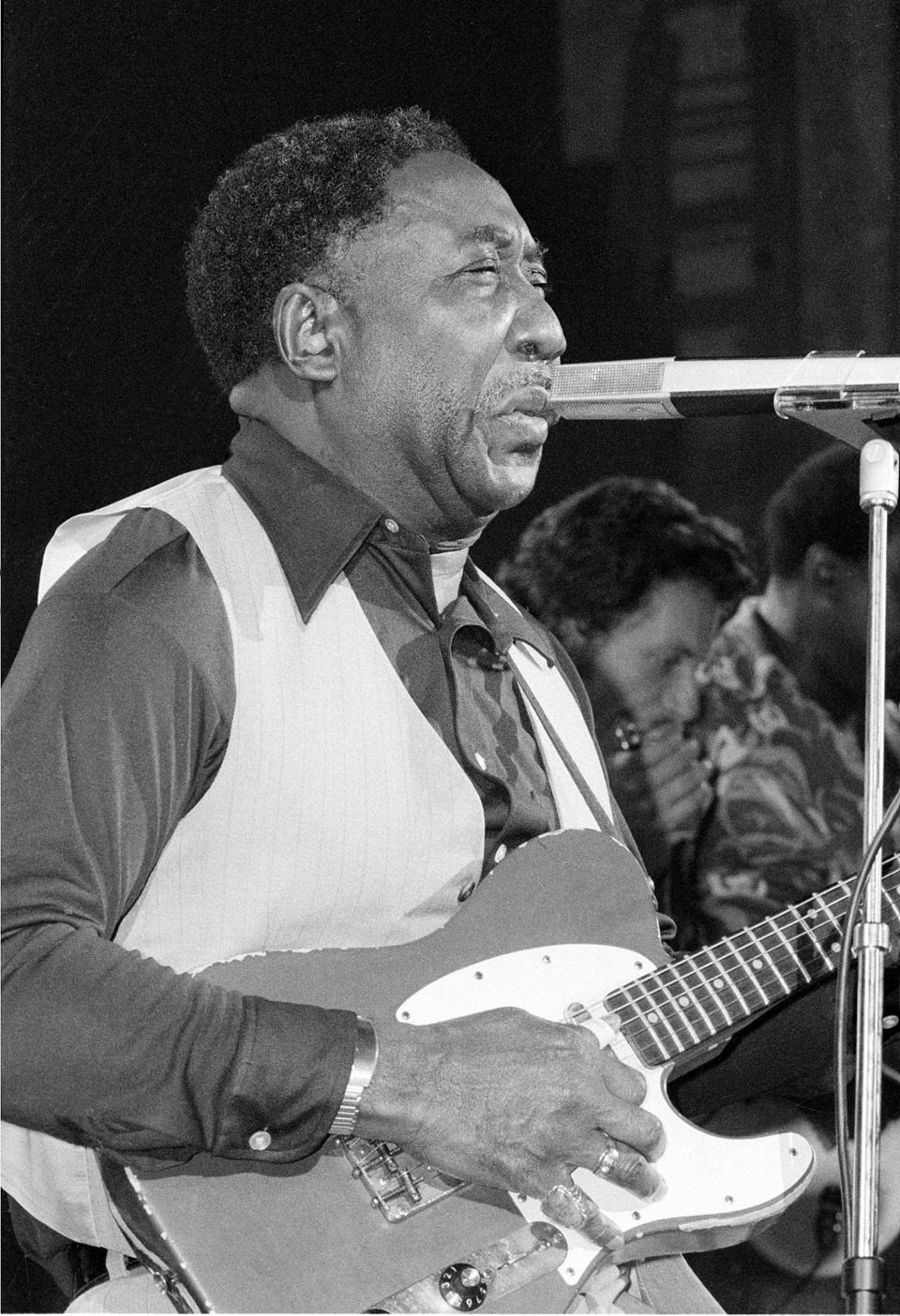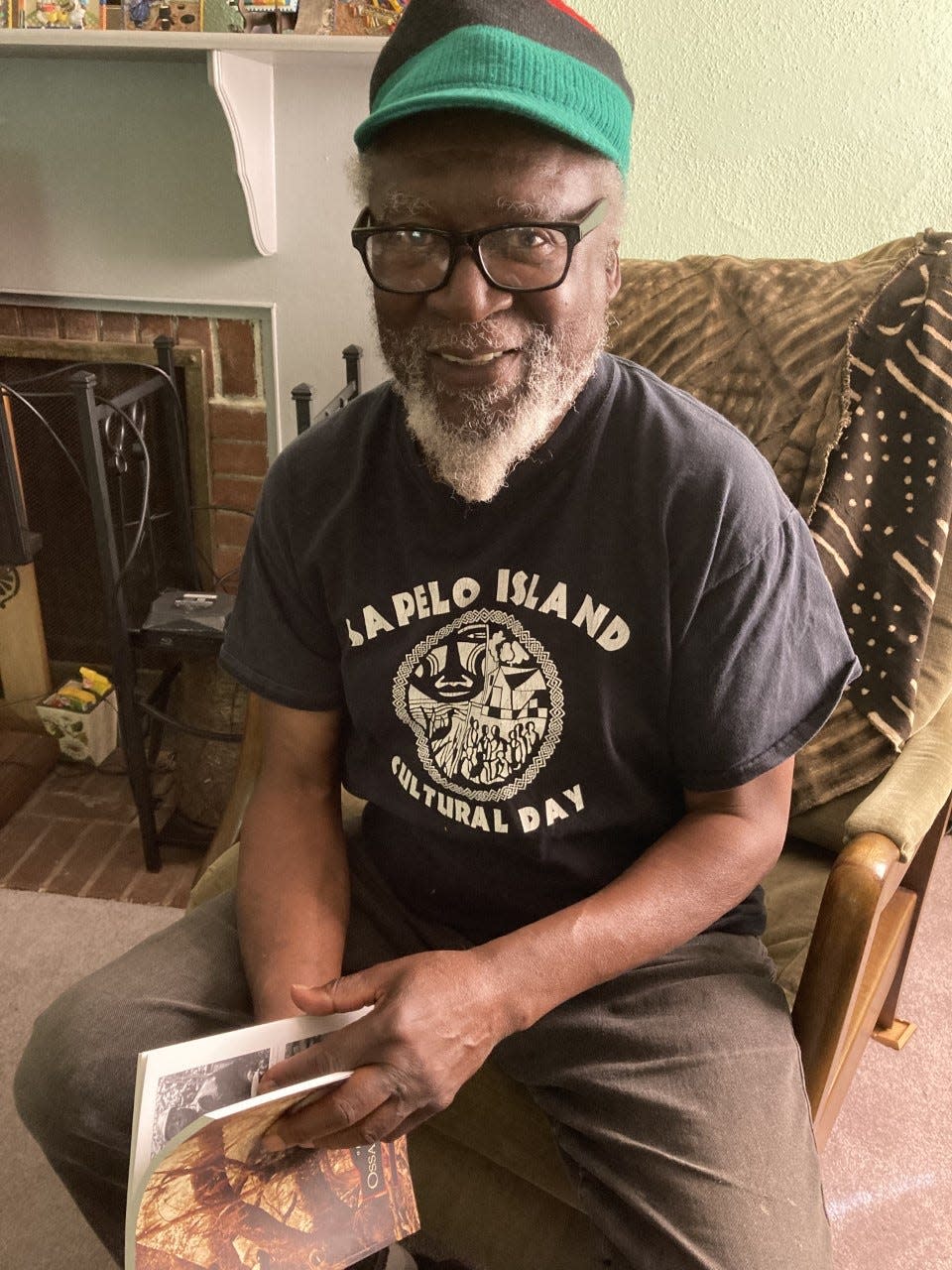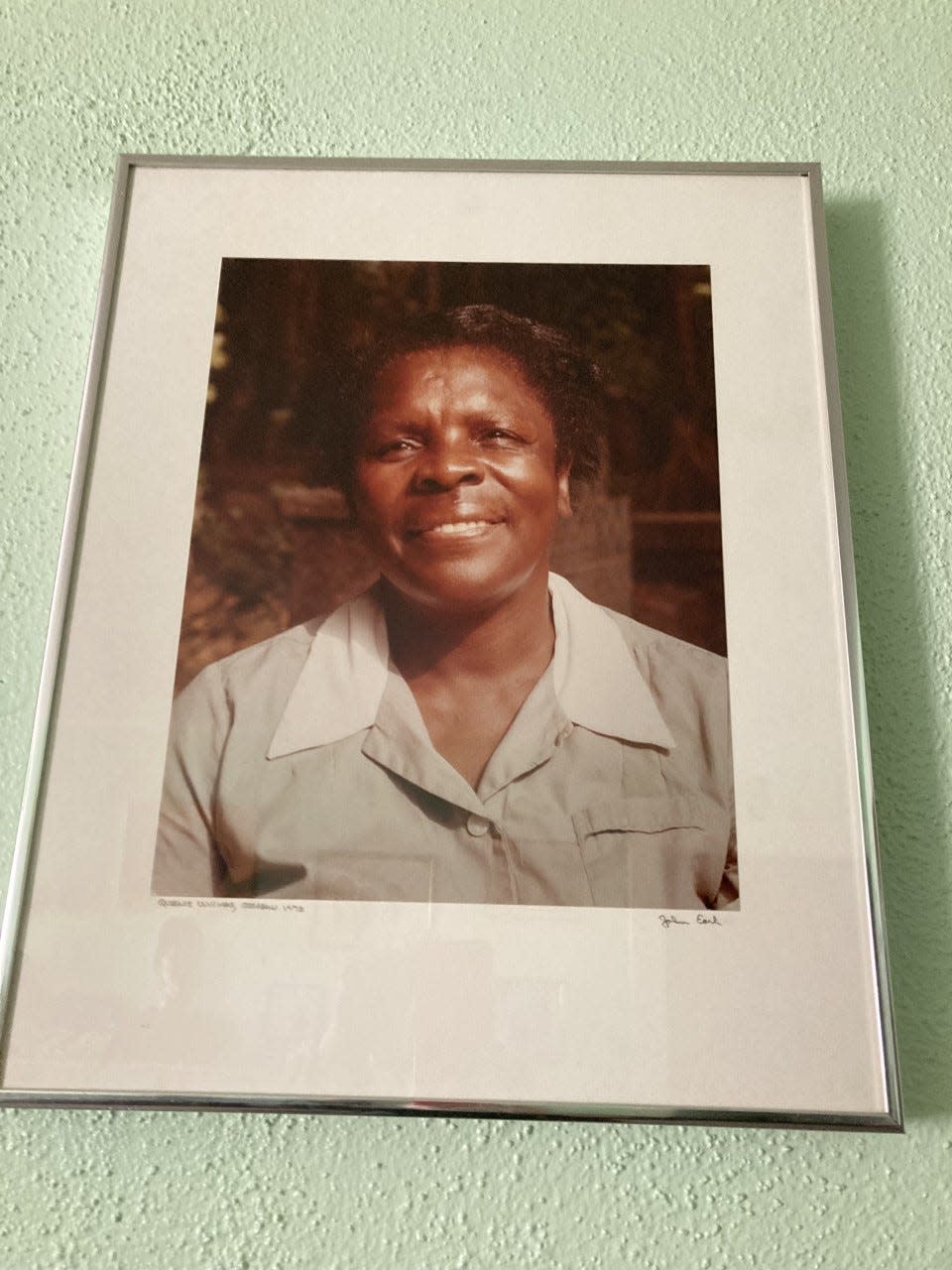'It's the joint': Roosevelt Brownlee feels at home on Ossabaw, filled with tales of food and jazz
- Oops!Something went wrong.Please try again later.
Before he steps out the screen door that leads into a modest backyard garden, Roosevelt Brownlee stops to grab a long blue-handled hoe.
“Snakes,” he says, pointing to the woods standing between his house east of Bee Road and the Truman Parkway. “See there? One’s slithering away. It’s an indigo black spine snake.” It’s nice not to have houses crowding in on you, he allows, but trees and shrubs are a perfect habitat for snakes.
“I don’t like snakes,” he says.
Recent Fishman columns: 'Women helping women': After 200 years, the Savannah Widows' Society emerges from the shadows
An orchid?: Isn't there enough already we keep alive and beautiful. Now we're adding a plant?
Jane Fishman: A quest for the ages: Where to find the perfect meal? Hold on, I'm getting a call.
It’s an unpretentious garden. Very unassuming, very compact, function over fashion, staked with scrap pieces of wood, sections of rebar to catch some climbing vines. I saw a few tomato cages but no tomatoes. He’s growing, among other things, a bunch of different field peas, okra, peanuts and some Carolina gold rice (“not that it’ll make enough to eat but it’s pretty, it’s ornamental”).

At 75, Brownlee, who went to Johnson High School, doesn’t make a big deal out of something if it’s not going his way. He just changes course.
When he finished his voluntary military service in Vietnam, mainly as a cook, and couldn’t land a job in Savannah, his hometown, he took off for San Francisco. It wasn’t so easy there, either. The system, he said, was beating him down. Those were heady days of the Soledad Brothers and the Black Panther Party. Always open to the next adventure, he perked up when he saw a billboard to “Fly Scandinavian.”
Which is what he did. He flew to Copenhagen. When nothing opened up there he flew to Sweden, got a job cooking, went to school to learn the language and married a local woman. He carried on.
By this time word of his culinary chops started to slip out. The man from Savannah (who had worked at the Boars’ Head Grill on River Street when he was 14) knew his way around food – much better than the Swedish cooks who were working at the Best of Harlem restaurant in Stockholm. His trajectory was about to change again. A jazz impresario named Jack Jordon enticed Brownlee to work the Montreaux Jazz Festival in Switzerland. Jordan needed someone to cook for the musicians: Muddy Waters, Stan Getz, Thad Jones.

“When I met Dizzy Gillespie he said, ‘Where you from, Cookie? You Geechie?’” Brownlee remembered. “Sure enough, he was from South Carolina. He was Geechie, too.”
Gullah Geechies, African Americans who lived in the Lowcountry in South Carolina and Georgia, were not so hip then. They were outsiders. Now their food and culture are starting to be recognized. Now they’re starting to be popular.
Jane Fishman: Chilled air and good vibes? Who doesn't like Northern California? Just don't check rent price.
Also: What would Papa do? Looking for answers on Ukraine as conflict with Russia continues
Read More: Chefs, farmers and storytellers gather to connect Gullah Geechee foodways and culture
“Back then we walked down the street with the musicians and people would want my autograph,” Brownlee said. “I couldn’t fry enough chicken. People in Europe love jazz.”
He stayed in Josephine Baker’s 8th floor apartment in Monte Carlo. Once he served Nina Simone. “I wasn’t ready for that one,” he said. “She was smooth, kind of quiet. I was tongue-tied.”
He didn’t want to come back to the U.S. But it was time, he said. He got jobs at the De Soto Hilton and Club 10,000 on Waters Avenue. He worked on Daufuskie Island and at the Gullah Festival in Beaufort, S.C.

A few weeks ago Brownlee was invited to visit Ossabaw Island on Heritage Day for descendants of folks who spent time on the barrier island – enslaved people, tenant farmers, cattlemen or timbermen. He had never there before.
“I had a great time. It’s raw and wide like nothing else. I knew one of my ancestors worked there many years ago but I didn’t know of his legacy. Pride swallowed me up as people talked about him. He was James Brownlee, my dad’s first cousin. He was a legend, a cow wrangler. I think I saw him ride in the St. Patrick’s Day Parade. He had a peg leg. He was married to Queenie Williams, who worked for Ms. West. I saw a photograph of him riding a horse with her.”
He thinks he stayed in the last tabby house on the island.
“There’s Queenie,” he said, pointing to an iconic framed photograph of Queenie taken by well-known photographer John Earl. A copy used to hang in Sandy West’s kitchen on Ossabaw.

These days Brownlee is working on a cookbook, but the man’s still cooking (mainly for himself and friends). He’s known for dishes like sheepshead fish cooked in an open pit or a hole in the ground with asparagus, mushrooms, toasted benne seeds and a drizzle of lemon juice; stuffed zucchini flowers, roasted beets with rosemary, plantains and red rice.
He’s generous with his cooking – but also his heirloom seeds. He may not grow enough to cook with but he always saves seeds to grow again and to give away.
Jane Fishman: Relying on obits for the news: Remembering an old friend in Susan Johnson
I left with little packages of benne seeds, Sea Island red peas, Sapelo red peas, garlic chives and Cherokee purple hull runners (“they’re a hot commodity”).
“Being at home is the best,” he said. “It’s the joint.”
Jane Fishman is a contributing lifestyles columnist. Contact her at gofish5@earthlink.net or call 912-484-3045. See more columns by Jane at SavannahNow.com/lifestyle/
This article originally appeared on Savannah Morning News: Roosevelt Brownlee: From cooking in Sweden to jazz with Muddy Waters

